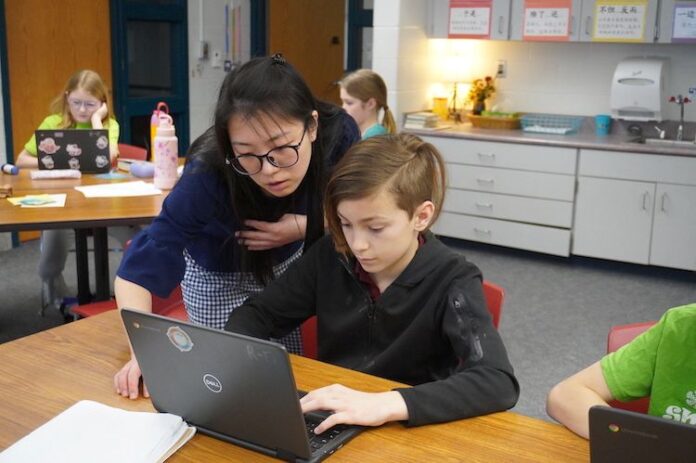Forest Hills — What fifth-grader Isabella Turner enjoys most about her Mandarin Chinese Immersion class is that her teacher, Yuqi Zhao, makes it a lot of fun.
“She has fun projects that make Chinese enjoyable,” Isabella said, as she pointed to posters that students made to demonstrate their knowledge of the Chinese language. “I think the posters we did were the most fun thing. She also has fun games and puts us with friends and partners and gives us rewards when we do well.”

Zhao recently was recognized for her excellence in Chinese-language teaching and for building a bridge in language by being named one of the five finalists of the United States Heartland China Association’s Chinese Teacher Award.
Zhao was nominated for the honor by her former Principal Sue Gutierrez, who retired last year. Zhao then went through the application process to be considered for the award.
“The best thing about teaching Chinese — especially the students, I love fifth-graders — (is when) they have that connection, that ‘aha’ moment,” Zhao said. “They are making connections as a Chinese learner and they see it in their daily life, and they are making connections to English and that is the most interesting thing to see.”
As an example, Zhao said every Friday she shows Chinese cartoons that are usually stories the students have not studied. From the cartoon, the students connect the words and phrases to what they have learned in class, she said.
“Every day I see them growing not only in their language skills, but in their confidence, in their curiosity about the world and that keeps me excited about teaching,” Zhao said. “It is incredibly rewarding to watch them go from struggling a little bit to mastering the characters, the sentence structures and they can hold a whole conversation. That is so rewarding and amazing to see.”
Her Journey to Teaching
Because Zhao’s grandparents ran a grocery store in her hometown of Chengdu, the capital city of Sichuan Province in China, Zhao had planned to become a business woman.
An opportunity in her third year of college to come to the United States changed the trajectory of her plans.
For two months that summer, she worked as an ambassador, sharing about her country and culture with American students.
“So I shared my hometown Chinese culture to sixth-graders and I remember it was in Austin, Texas, that presentation was kind of a turning point for me,” Zhao said. “I was so touched and moved to introduce my culture and country to the sixth-graders that I decided to be a Chinese teacher in the U.S.”
She went back to her college, Sichuan Normal University in Chengdu, earned her bachelor’s degree in financial management and began looking at how she could become a teacher. Her search brought her to Michigan State University, where she entered a master’s program for education.
Required to teach for the program, Zhao was hired as a teacher for Forest Hills’ Mandarin Chinese Immersion Program, which was started in 2008 as the first of its kind in West Michigan.
Because of her passion to share her language and culture with other people, Zhao’s plan had been to stay at Forest Hills for a couple of years as she completed her master’s and then travel. But again her plans changed.
“It doesn’t feel like it’s been over 10 years,” Zhao said, adding that Forest Hills is like a big family that has provided a lot of support to the Chinese immersion program. “It feels like I just started my work a couple of years ago. I really enjoy it here and I really appreciate all the support from my teaching partner, administrators and the families.”
‘It is incredibly rewarding to watch them go from struggling a little bit to mastering the characters, the sentence structures and they can hold a whole conversation.’
— Chinese teacher Yuqi Zhao
Making an Impact
The district’s Chinese immersion program is K-12, so many of Zhao’s students have been studying the language for several years.
Zhao team-teaches with Luke Florek, who focuses on science, math and English. The students also have music, gym and media classes.
Zhao’s goal is to make learning Chinese easier for students, she said. To do that, she incorporates how they teach reading and writing in China, such as having students identify the structure of different characters.
“So if you have zero knowledge about Chinese when you see the characters, you will get overwhelmed,” Zhao said. “You don’t know what that means (or) how to pronounce it.”
This is because Chinese characters mainly represent words, not sounds, and are built from smaller components to make the character, she said. Having students identify the structure of a character, whether the components are side-by-side, top-bottom, etc., helps them understand and learn the character, she said.

In the classroom, students were working on a project where they broke down characters by their structure, wrote the pronunciation and a definition in Chinese and included two to three pictures as proof of the definition.
“It helps to organize the words into groups, which in turn helps us to understand the written word,” said fifth-grader Gwen Herrema. “So when you are in high school, you are able to identify the word correctly.”
Gwen said Zhao makes the class easy to understand, and that activities such as matching Chinese characters to the phonetic spellings are fun and interesting.
Although she appreciates the praise for being a good teacher, Zhao said the true measure of her success lies in her students’ performance.
“Last week, there were (some older students) who came back to my room and they could still remember the story we learned in fifth grade, and they started to recite it,” she said. “I was so proud of that.”
Read more from Forest Hills:
• Red envelopes & hot pots: Elementary celebrates Chinese New Year
• Opening students’ eyes to their connect to the world











